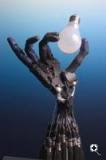Anti-Wage-Slavery, Pro-Freedom Quotations Of The Week 299-302
 Technological progress ... has provided society with what economists call a "free lunch," that is, an increase in output that is not commensurate with the increase in effort and cost necessary to bring it about.
Technological progress ... has provided society with what economists call a "free lunch," that is, an increase in output that is not commensurate with the increase in effort and cost necessary to bring it about.Joel Mokyr, Lever of Riches: Technological Creativity and Economic Progress (1990)
A half century ago, in 1957, the future Nobel Prize-winning economist Robert Solow calculated that nearly 90 percent of productivity growth in the first half of the twentieth century (from 1909 to 1949) could only be attributed to "technical change in the broadest sense." 
The supply of labor and capital -- what workers and employers contribute -- appeared almost incidental to this massive technological "residual." Subsequent research inspired by Solow has continued to put a spotlight on "advances in knowledge" as the main source of growth. Another highly respected economist, William Baumol, argues that "nearly 90 percent ... of current GDP was contributed by innovation carried out since 1870." Baumol judges that his estimate, in fact, understates the cumulative influence of past advances: even "the steam engine, the railroad, and many other inventions of an earlier era still add to today's GDP."
The Rich Are Hogging Our Common Inheritance -- We Must Take It Back
By Gar Alperovitz and Lew Daly, The New Press.
Posted December 8, 2008.
 It's worth reflecting that everything that Mother Nature has supplied to mankind in the way of land, air and natural resources, and all the
It's worth reflecting that everything that Mother Nature has supplied to mankind in the way of land, air and natural resources, and all the
accumulated wisdom, knowledge and skills of past ages, are received by the present generation as a "free lunch".
The catch is that over the years, various interests have all managed to corner some portion of this, and make a good living selling or renting it to those who are without, who have to pay the rent. That is how the capitalist system works.
So we have this great gap between the rich (who have investments), and the poor (who have nothing but their labour to sell, and by the "iron laws of economics", have to pay in rent or interest everything they earn above subsistence level). A consequence is the desperate need under our present system for "full employment", so that these peons can have a source of income even if they destroy the environment by doing so much unnecessary work (including wars and armaments).
That, to me, is the moral justification for guaranteeing a basic income to
all.
Martin Hattersley
The "sling" is Lord Dumpling's revolutionary new version of the Stirling engine, a no-emission power source that engineers have been trying to perfect for almost two hundred years. Instead of the tiny explosions that drive the pistons of a standard internal-combustion engine, the Stirling drives its piston by forcing gas from one chamber to another in a perfectly closed system. He's pretty much got it nailed, aside from a few tweaks and a few niggling questions about who will pay for it. The "shot" is his equally revolutionary vapor-compression water distiller, which can make pure medicinal-grade water out of anything that's wet, even urine or toxic waste -- water so clean you could inject it into your arm. Together, the sling and the shot could save millions of lives. That's why he spent $50 million of his own money developing the prototypes and testing them in Third World villages, and they work, and we have to get the word out because 50 percent of all human illness is caused by waterborne pathogens.

…
Here's the vapor-compression distiller. The vapor goes through this hose and comes into the turbine heat exchangers here and there's no noise and no consumables and no activated charcoal and no chemicals and no filter and no membranes. It makes a million liters of water in a thousand days with no human intervention. …
there was no real market for it. The poor people who needed it couldn't even begin to afford it, so no big corporation wanted to invest $50 million or $100 million or more to tool up a factory and take it to market. "So now you've got these things, and you go, 'Wow, the kinds of companies that we do business with have to make their return. They're not going to do this.' …
So he did some field trials, putting the distiller in a village in Honduras and the Stirling in a village in Bangladesh. And they worked. Marvelously. Magically. He proved that. And still nobody would finance them. … To think that 20 percent of the people alive today are perfect -- more than perfect, desperate -- customers for this beautiful technology and organizations like the UN and WHO are so rigidly organized and their thinking is so monolithic and their model of risk and reward is so narrow that they can't conceive of taking a prototype to production even if it will save millions of lives....
How Dean Kamen's Magical Water Machine Could Save the World


0 Comments:
Post a Comment
<< Home